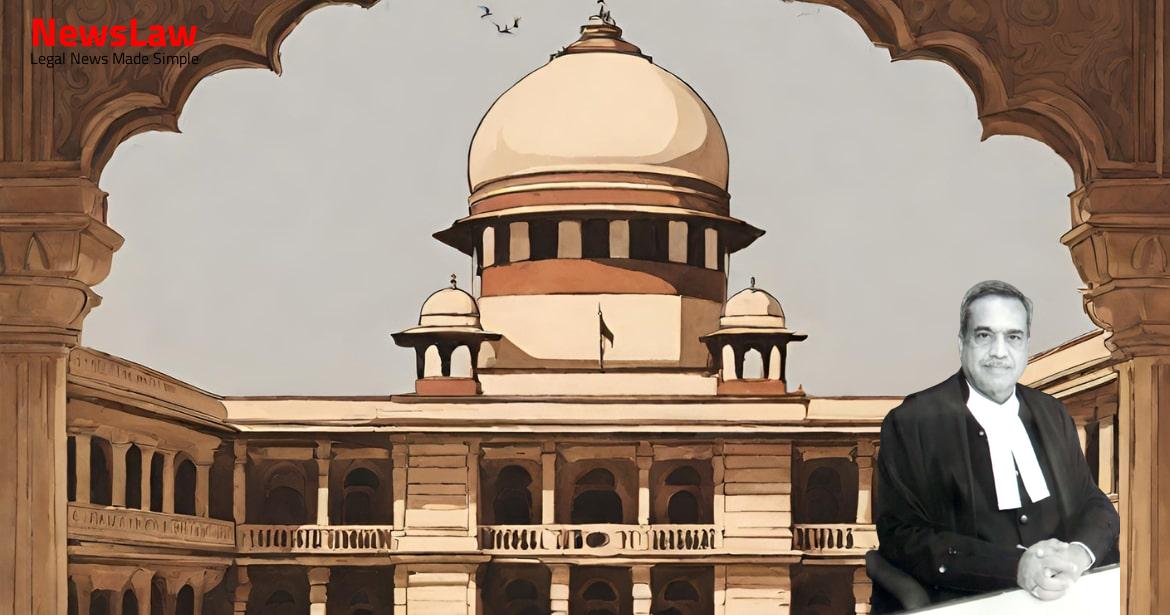Explore the detailed legal analysis conducted by the court in a complex stock exchange membership dispute. The case involved the interpretation of Byelaws, Rules, and Regulations governing trading memberships, as well as the authority of the Exchange in matters of expulsion and closing out of positions. The court’s in-depth analysis sheds light on the legal framework surrounding stock exchange operations and member compliance, providing valuable insights into the regulatory landscape.
Facts
- The Committee concluded that RSL failed to substantiate the failure to meet the capital adequacy requirements for continued admittance of trading membership of the Exchange.
- As a result, the Committee decided to suspend the membership of RSL effective from February 16, 2005.
- Another show-cause notice was served to the appellant by NSE on 20.10.2005, this time for the expulsion of membership.
- On 19.05.1997, the Exchange circulated Circular No NSCC/CM/C&S/030, originally issued by the Clearing Corporation, to all trading/clearing members.
- The appellant was found to have exceeded the gross exposure limits while trading by more than 10%, resulting in the withdrawal of their trading facility by the respondents.
- The appellant was asked to deposit certain amounts and failed to comply, leading to the closing out of their open positions in various securities.
- Legal proceedings were pursued by the appellant against the respondents at various forums, including the High Court of Calcutta and SEBI.
- The exchange informed the appellant about appropriation of certain amounts from their security deposits for membership charges, triggering a demand for additional deposit to enhance trading limits.
- The Exchange suspended the membership of the appellant on 16.02.2005 after a persistent legal dispute lasting for 7 years.
- The appellant, registered as a trading member with NSE in November 1994, had various deposits collectively termed as the Base Capital amounting to Rs.1.29 crores.
- The Tribunal upheld the order of expulsion against the appellant from the membership of the National Stock Exchange of India Limited in its judgment dated 13.01.2009.
- The Tribunal determined the total liability of the appellant towards the respondents (Exchange).
- The final figure of Rs.2.41 crores was arrived at for the total liability.
- This amount was deemed to be the final liability owed by the appellant to the respondents.
Also Read: Land Acquisition Notification Process: Legal Analysis
Issue
- The basic question raised in this appeal is whether the respondent NSE is legally entitled to withhold the securities of the appellant who has been suspended/expelled since 2005/2006.
- The Tribunal referred to a previous case, Appeal No 84 of 2008, where the expulsion order was upheld, indicating that the issue has already been addressed.
- On the merit of the case, the Tribunal found that the appellant had been communicated multiple times regarding the dues owed to NSE and NSCCL along with calculations.
Also Read: Legal Analysis on Diplomatic Immunity Exception Case
Arguments
- Appellant contends that the circular withdrawing trading facility was void ab initio as it violated the Byelaws, Rules, and Regulations.
- Stock exchange’s power to close out open transactions of reckless trading members is crucial for investor protection.
- Appellant argues that NSCCL’s circular does not hold legal sanctity equivalent to Byelaws, Rules, and Regulations of the Exchange.
- Appellant challenges the Exchange’s authority to close out outstanding positions before the due date as per Byelaws 17 and 18.
- Bye-law 18 is viewed as complementary to Bye-law 17, allowing for different reasons and circumstances for closing out positions.
- The necessity of Bye-law 18 is emphasized to cover reasons beyond those mentioned in Bye-law 17.
- Appellant’s trading facility withdrawal led to an alleged illegality, impacting the market and investors.
- Expulsion from membership decision is disputed by the appellant on the grounds of lack of independent operation of clause 18 in closing out provisions.
- Maintaining the power to discipline trading members is deemed essential by the appellant, citing the need for coherent implementation of Bye-laws 17 and 18.
- Respondents argue that the circular issued by the Clearing Corporation does not override any Exchange Byelaws, Rules, or Regulations.
- Circumstances not covered by clause 17 can be addressed under clause 18 according to the respondent.
- The appellant had given an undertaking to comply with the Clearing Corporation’s rules and circulars.
- No further approval was required for action under the Byelaws since they were approved by the Central Government.
- Closing out a transaction is a process that starts in clause 17 and concludes in clause 18.
- The Exchange Byelaws require payment of fees, security deposits, and margins specified by the Board or relevant authority.
- Stock exchanges must have the power to close out transactions in cases of reckless conduct in the market.
- Similar provisions for admission and membership maintenance exist in the Clearing Corporation Byelaws.
- Closure of transactions is not solely restricted to clause 17, as per the respondent’s argument.
- The Byelaws of the Exchange were put into effect after approval by the Central Government.
- The appellant failed to maintain the necessary Security Deposit despite multiple reminders from the Exchange.
Also Read: Autonomy of Private Unaided Schools in Fee Determination
Analysis
- Trading members are required to adhere to the Bye Laws, Rules and Regulations of the Exchange and comply with operational parameters and instructions.
- Any registration granted by SEBI is subject to conditions and compliance with stock exchange Rules and Byelaws.
- Stock exchanges are primarily engaged in buying, selling, and dealing in securities, with clearing and settlement being integral operations.
- The appellant gave an unconditional undertaking to abide by the Rules, Byelaws, and Regulations of the Exchange and the Clearing Corporation.
- Regulatory provisions and Byelaws outline prerequisites, conditions, and procedures for trading membership.
- The appellant is bound by the undertaking given to the respondents as per the regulatory framework.
- Provisions specify actions for continued membership admittance, non-payment consequences, and closing out of contracts.
- The legislature mandates adherence to Byelaws and Rules for matters related to admission, qualification, and expulsion of members.
- Recognition of stock exchanges is granted based on conformity with prescribed conditions for fair dealing and investor protection.
- Closure of contracts is governed by specific conditions and procedures set by the relevant authority.
- The Byelaws of the Clearing Corporation also outline provisions for closing out on default or failure to comply with deal terms.
- Equity is about balancing competing interests to prevent erosion of interests of one party.
- Specific fiduciary duties can be recognized in a case, but the performance of these duties cannot be dictated in regulatory matters.
- A fiduciary relationship involves a scope for the exercise of discretion or power, which can affect the beneficiary’s interests.
- The discretion must be exercised freely, intelligently, and in a bona fide manner.
- Professor Frankel highlights the need to deter fiduciaries from misappropriating vested powers for their own purposes, as beneficiaries are vulnerable in such relationships.
- Equity and fiduciary principles operate according to specific facts and governing provisions.
- A constructive trust arises by operation of law in scenarios where it would be unconscionable for the owner to deny another’s beneficial interest.
- The duty of the respondent to act as a prudent person in relation to withheld securities is established, but it remains to be determined if this duty requires a mandatory obligation for unilateral registration.
- The scope of fiduciary duties is determined by the nature of the relationship and facts of the case, with the Exchange having discretion in decision-making.
- Return of security deposit was to avoid continuation of criminal proceedings, not admission of guilt or waiver of claim
- Effect of return limited to quashing of criminal proceedings involved
- Loss caused to Exchange due to return of security deposit should be considered in determining appellant’s total liability
- Adjustment of the loss should be made by respondents appropriately
Decision
- An amount of Rs.1.74 crores has been recovered by the respondents from transferred securities, fixed deposits, and corporate benefits.
- Approximately Rs.66.81 lakhs is still remaining to be recovered.
- Section-22F only entertains appeals on questions of law.
- The matters in issue in the present set of appeals are different from those in the special leave petition (criminal).
- Directions issued for the settlement of claims include evaluation and transfer of remaining securities, return of unrealized securities to the appellant, recovery of surplus amount with interest, communication of inability to recover funds, and oversight by NSE for evaluation and realization of remaining securities.
- Both appeals are disposed of as per the given terms with no order on costs, and pending applications are also resolved.
- The quantum of amount due from the appellant to the respondents has been determined by the Tribunal and is not interfered with.
Case Title: RUSODAY SECURITIES LTD. Vs. NATIONAL STOCK EXCHANGE OF INDIA LTD (2020 INSC 650)
Case Number: C.A. No.-002690-002690 / 2009



